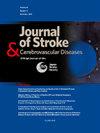Association of cardiometabolic index and risk of stroke: A systematic review and meta-analysis
IF 2
4区 医学
Q3 NEUROSCIENCES
Journal of Stroke & Cerebrovascular Diseases
Pub Date : 2025-05-02
DOI:10.1016/j.jstrokecerebrovasdis.2025.108337
引用次数: 0
Abstract
Background
Stroke remains a leading cause of morbidity and mortality worldwide, contributing significantly to public health burdens. Cardiovascular and metabolic risk factors such as diabetes, hypertension, obesity, and dyslipidaemia are strongly associated with an increased risk of stroke. The cardio-metabolic index (CMI), which integrates these factors into a single measure, has emerged as a potential predictor of stroke. This systematic review and meta-analysis intended to examine the link between CMI and risk of stroke, offering an in-depth evaluation of its predictive value
Methods
A systematic search was conducted in PubMed, Embase, and Web of Science until 10 December 2024. The inclusion criteria focused on observational studies (cohort, cross-sectional, and case-control) that reported original data on the association of CMI and stroke risk. Data extraction was standardized, and quality was assessed using the Newcastle-Ottawa Scale. Meta-analysis was performed using a random effects model in R software version 4.4
Results
From 545 articles initially retrieved, with 5 studies met inclusion criteria, encompassing over 100,000 participants. Meta-analysis showed a significant association between elevated CMI and stroke risk with a pooled RR of 1.66 (95 % CI: 1.25 to 2.20). A subgroup analysis of cohort studies yielded a pooled HR of 1.63 (95 % CI: 1.21 to 2.21). There was no significant heterogeneity across studies (I² = 0 %).
Conclusion
Our findings demonstrated a strong association between elevated CMI and an increased risk of stroke. CMI, by integrating multiple cardiovascular and metabolic factors, serves as a comprehensive predictor of stroke risk. Incorporating CMI into routine health screenings could enhance early identification and prevention efforts, ultimately aiding in the reduction of stroke incidence.
心脏代谢指数与中风风险的关联:系统回顾和荟萃分析。
背景:中风仍然是世界范围内发病率和死亡率的主要原因,对公共卫生负担有重大影响。心血管和代谢风险因素,如糖尿病、高血压、肥胖和血脂异常与卒中风险增加密切相关。心血管代谢指数(CMI)将这些因素整合为一个单一的测量指标,已经成为中风的潜在预测指标。本系统综述和荟萃分析旨在研究CMI与卒中风险之间的联系,并对其预测价值进行深入评估。方法:在PubMed, Embase和Web of Science中进行系统搜索,直到2024年12月10日。纳入标准侧重于观察性研究(队列、横断面和病例对照),这些研究报告了CMI与卒中风险关联的原始数据。数据提取标准化,使用纽卡斯尔-渥太华量表评估质量。结果:从最初检索的545篇文章中,有5篇研究符合纳入标准,涉及超过10万名参与者。荟萃分析显示CMI升高与卒中风险之间存在显著关联,合并RR为1.66 (95% CI: 1.25 - 2.20)。队列研究的亚组分析显示,合并风险比为1.63 (95% CI: 1.21至2.21)。各研究间无显著异质性(I² = 0%)。结论:我们的研究结果表明CMI升高与卒中风险增加之间存在强烈关联。CMI通过综合多种心血管和代谢因素,可作为脑卒中风险的综合预测因子。将CMI纳入常规健康筛查可以加强早期识别和预防工作,最终有助于减少中风发病率。
本文章由计算机程序翻译,如有差异,请以英文原文为准。
求助全文
约1分钟内获得全文
求助全文
来源期刊

Journal of Stroke & Cerebrovascular Diseases
Medicine-Surgery
CiteScore
5.00
自引率
4.00%
发文量
583
审稿时长
62 days
期刊介绍:
The Journal of Stroke & Cerebrovascular Diseases publishes original papers on basic and clinical science related to the fields of stroke and cerebrovascular diseases. The Journal also features review articles, controversies, methods and technical notes, selected case reports and other original articles of special nature. Its editorial mission is to focus on prevention and repair of cerebrovascular disease. Clinical papers emphasize medical and surgical aspects of stroke, clinical trials and design, epidemiology, stroke care delivery systems and outcomes, imaging sciences and rehabilitation of stroke. The Journal will be of special interest to specialists involved in caring for patients with cerebrovascular disease, including neurologists, neurosurgeons and cardiologists.
 求助内容:
求助内容: 应助结果提醒方式:
应助结果提醒方式:


